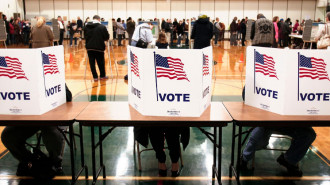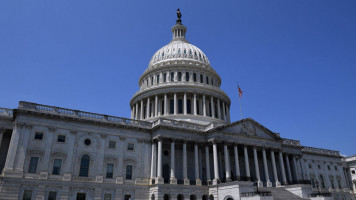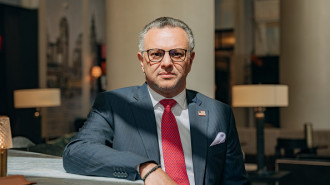Arab League accuses Israel of 'playing with fire' over al-Aqsa restrictions
The Arab League has accused Israel of "playing with fire" with the new security measures at a highly sensitive holy site in Jerusalem.
"Jerusalem is a red line," its chief Ahmed Abul Gheit said in a statement on Sunday, adding that "no Arab or Muslim will accept violations" against the city's holy sites.
Abul Gheit accused Israel's government of "adventurism" and said its moves could trigger a "crisis with the Arab and Muslim world".
Tensions have risen throughout the past week after Israel installed metal detectors at the Haram al-Sharif compound, known to Jews as the Temple Mount.
The site in Jerusalem's Old City that includes the revered al-Aqsa mosque and Dome of the Rock has been a focal point for Palestinians, and disputes over control and access to the holy site have set off major rounds of violence in the past.
Friday's violence, in which three Palestinians were killed and three Israelis were stabbed, was among the most severe in recent years.
On Saturday, two Palestinians died following clashes with Israeli forces in the West Bank, the Palestinian health ministry said.
The deadly clashes have drawn international attention and condemnation.
The UN Security Council is set to hold closed-door talks on Monday about the unrest, diplomats said.
The meeting - requested by Sweden, France and Egypt - would be to "urgently discuss how calls for de-escalation in Jerusalem can be supported," said Sweden's political affairs coordinator Carl Skau.
'Strongly condemned'
The Middle East Quartet, comprising the US, Russia, the EU and UN, also expressed concern, calling on all sides to "demonstrate maximum restraint."
The envoys of the four "strongly condemn acts of terror, express their regret for all loss of innocent life caused by the violence, and hope for a speedy recovery to the wounded," the Quartet said in a joint statement.
The holy site is located in East Jerusalem, which was captured by Israel during the 1967 Six-Day War and annexed in a move never recognised by the international community.
It is recognised as occupied Palestinian territory under international law. Since Israel's occupation in 1967, Jordan has been custodian of the mosque.
Jews are allowed to visit the compound but not pray there, a ruling supported by Jewish Halakhic law. In recent years, a movement in Israel to establish full Jewish sovereignty over the site has gained momentum.
![al-Aqsa clashes [Getty] al-Aqsa clashes [Getty]](/sites/default/files/styles/large_16_9/public/media/images/D1E62153-26DC-4572-A6B1-469642E4AB14.jpg?h=d1cb525d&itok=XeR3Sjin)
![Palestinians mourned the victims of an Israeli strike on Deir al-Balah [Getty]](/sites/default/files/styles/image_684x385/public/2024-11/GettyImages-2182362043.jpg?h=199d8c1f&itok=xSHZFbmc)


![The law could be enforced against teachers without prior notice [Getty]](/sites/default/files/styles/image_684x385/public/2178740715.jpeg?h=a5f2f23a&itok=hnqrCS4x)
 Follow the Middle East's top stories in English at The New Arab on Google News
Follow the Middle East's top stories in English at The New Arab on Google News


